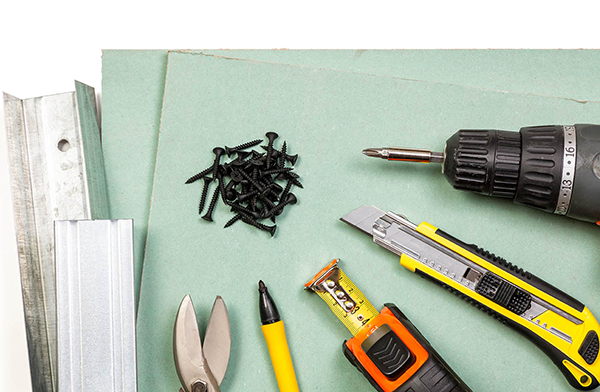When it comes to building your interior walls, do you understand the fire resistant properties of the products you plan to buy? Wood products, such as paneling, shiplap and wainscot, while not hazardous, per se, offer less resistance and more ready-to-burn fuel to a house fire compared to ordinary drywall and the fire-rated gypsum boards. Here, we answer the four common questions asked about drywall and fire resistance.
Is Drywall Naturally Fire-Resistant?
Although no wallboard is totally fireproof, the mineral in drywall can’t help but resist burning. Calcium sulfate dihydrate — gypsum — traps water molecules within its crystaline matrix. There it remains until exposed to heat higher than 176 degrees Fahrenheit. Gypsum contains about 20 percent water by weight and roughly 50 percent by volume. As it heats up, gypsum begins to release its water, preventing ignition or crumbling until the water has steamed away.
When forming the natural rock or synthetic gypsum into wallboards, first it gets milled to a fine powder, then heated to release its water, which creates plaster of Paris. Next, the manufacturer adds other ingredients and just the right amount of new water to create a paste to be rolled out between two thick sheets of paper.
Under the heat of a conflagration, regular drywall first expands as the water migrates out of the gypsum matrix, then cracks and crumbles in about 20 minutes or so. To increase the time to failure, manufacturers developed fire-rated Type X wallboard.
What is Type X Drywall?
For Type X drywall, the producer adds glass fiber to the gypsum slurry and rolls to a thickness of 5/8-inch minimum. The fibers act to reduce board cracking and forestall crumbling for up to an hour. In a fire, that extra time could make all the difference in the world. Many local building codes require Type X or better between attached garages and living spaces, and around furnace and boiler rooms. Now, the drywall industry has jumped ahead of the code minimums to offer Type C wallboards that perform far better than Type X.
What is Type C Drywall?
Type C drywall starts with the glass fiber mix and goes further by increasing the amount of glass and by incorporating a form of the mineral vermiculite. This vermiculite additive has an interesting property. Under high heat, it expands at about the same rate that the gypsum shrinks. So, when the fire drives off the water within the gypsum causing it to contract, the vermiculite expands to maintain board integrity.
When first invented by USG and tested in their laboratory in a controlled experiment, Type C drywall was pitted against a regular drywall board of 5/8-inches and a Type X board, under temperatures of 1850 degrees. They weighted the boards so they could pinpoint the moment of failure for each one. The standard board failed after 12 minutes. The Type X board lasted a significant 57 minutes, and the Type C board continued to hold up for 122 minutes at which time they ended the experiment. Upon examination, the Type C board had lost none of its core integrity after two hours. Subsequent independent testing also proved the extreme fire resistant qualities of the extra glass fibers and vermiculite-based additive in Type C drywall.
Will Fire Rated Gypsum Better Protect My Family?
While additional fire resistance theoretically helps in any building application, the question of whether fire-rated gypsum boards will perform as desired has a nuanced answer. Because laboratory testing and real-life fires remain subject to a vast array of variables, no one can promise that fire-rated drywall, whether Type X or Type C, will hold back flames long enough to escape or receive emergency response. Open doorways and stairwells, architectural or structural gaps that permit fire advancement, an abundance of combustible furnishings and a host of other considerations all come into play.
It seems reasonable that with fire-rated gypsum, if the unthinkable were to happen, you statistically increase your odds of protection. Ultimately, though, codes, cost and comfort level will guide you to the right decision for your project.
For more information on the availability and brands of our fire-rated gypsum products, please contact us at Jones Heartz today.


Great post, we get questions all the time about fire ratings and fire resistance. Going to direct people to this article anytime we get these questions, well laid out and easy to understand, thanks for the great share!
Best,
Josh Nellman
Drywall Contractors Lexington, KY